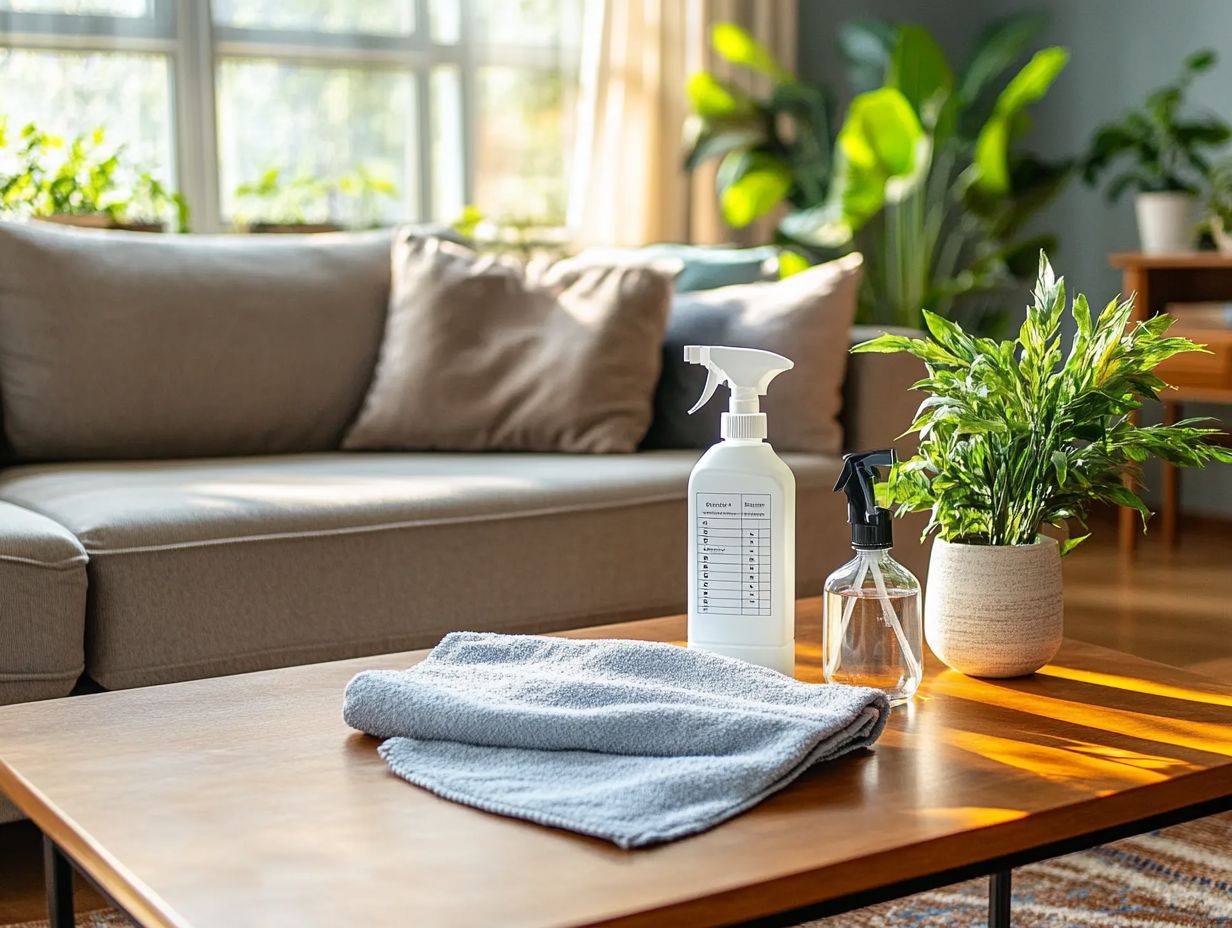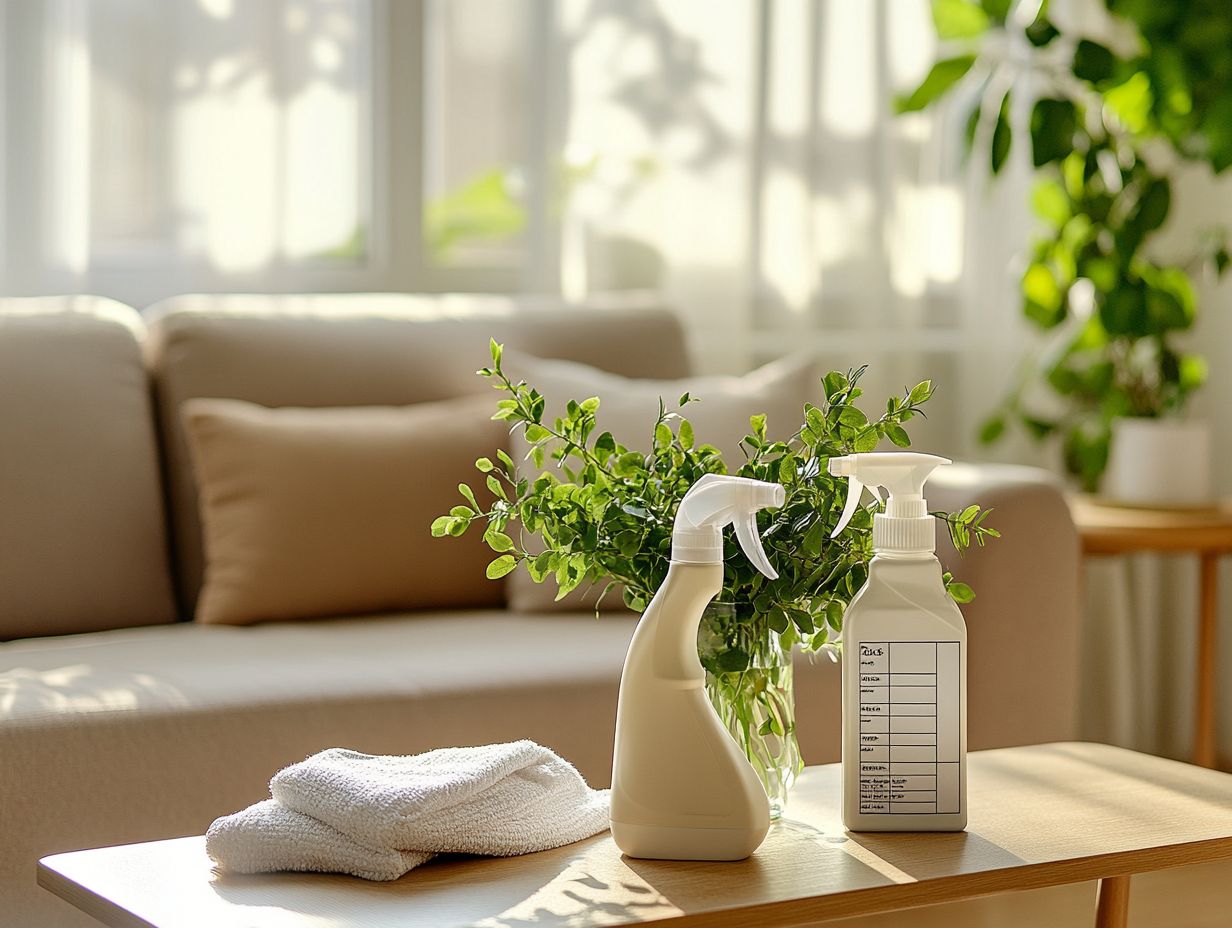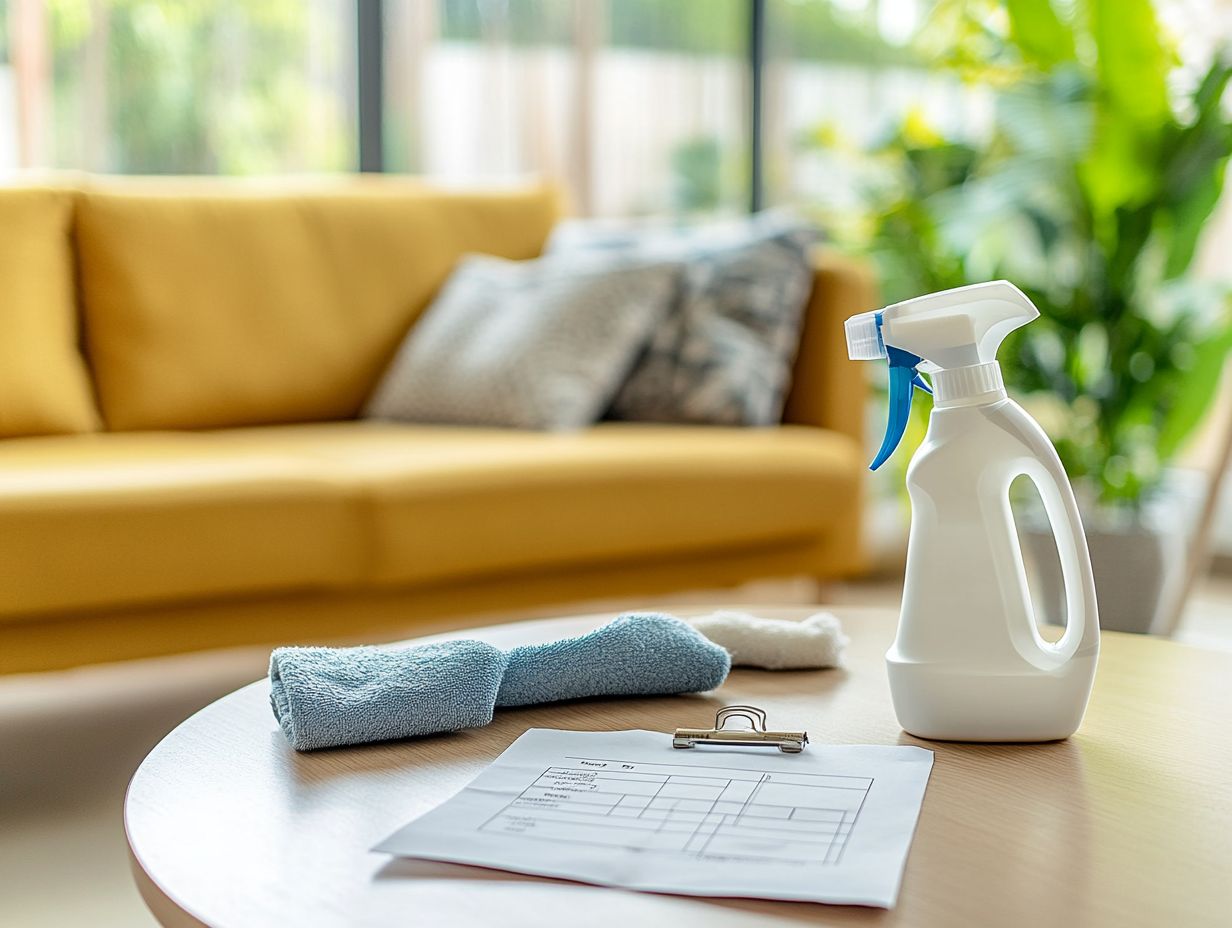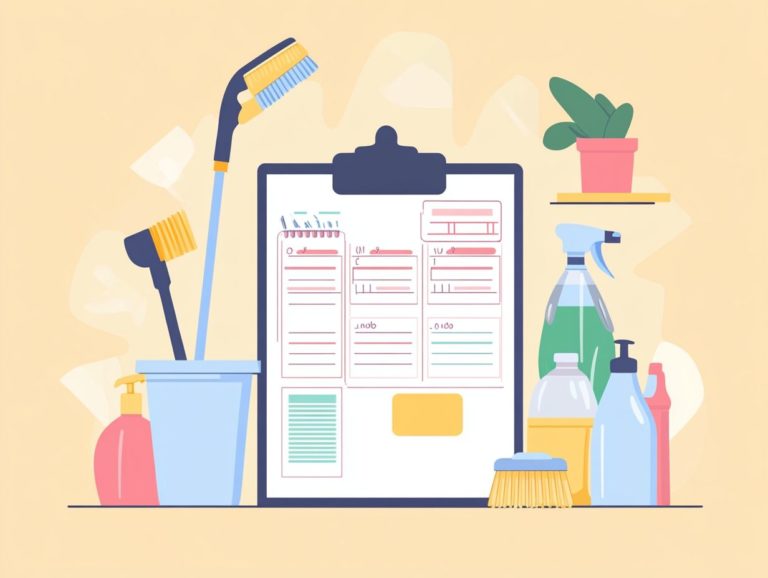How to Set Cleaning Goals for Your Home
Setting cleaning goals and home cleaning objectives for your home can elevate what often feels like an overwhelming chore into a manageable and gratifying endeavor.
When you establish these goals, you unlock a host of benefits boosting your productivity, enhancing your home organization, alleviating stress, and refining your time management skills.
Explore effective strategies for setting realistic cleaning objectives. Discover practical cleaning tips to keep your cleaning motivation high, and learn about common pitfalls to steer clear of.
By the end of this journey, you’ll be fully equipped to craft a cleaner, more inviting space that reflects your aspirations.
Contents
- Key Takeaways:
- Why Set Cleaning Goals for Your Home?
- What Are the Benefits of Setting Cleaning Goals?
- How to Set Effective Cleaning Goals
- Tips for Staying Motivated and Achieving Your Cleaning Goals
- Common Mistakes to Avoid When Setting Cleaning Goals
- Frequently Asked Questions
- What are some tips for setting cleaning goals for my home?
- How can I stay motivated to achieve my cleaning goals?
- What are some common mistakes people make when setting cleaning goals for their home?
- How often should I set new cleaning goals for my home?
- Can I include my family or roommates in setting cleaning goals for our home?
- What are some examples of specific cleaning goals I can set for my home?
Key Takeaways:

- Setting cleaning goals for your home can increase productivity, decrease stress, and improve time management.
- To set effective cleaning goals, start with your end goal in mind, break tasks into manageable chunks, prioritize based on importance and urgency, and set a realistic timeline.
- Stay motivated and achieve your cleaning goals by celebrating small accomplishments, getting an accountability partner, creating a reward system, and using visualization techniques.
Why Set Cleaning Goals for Your Home?
Setting cleaning goals for your home is crucial for keeping your home neat and enhancing your overall emotional well-being. By defining clear and achievable cleaning objectives, you can effectively declutter your space, create a comprehensive cleaning checklist (a list of tasks to help you clean your home efficiently), and establish a consistent cleaning routine.
This approach helps you manage clutter better and boosts your confidence, enabling you to tackle tasks more efficiently and uphold your cleaning standards throughout the year.
What Are the Benefits of Setting Cleaning Goals?
Setting cleaning goals brings a wealth of benefits that can significantly elevate both the cleanliness of your home and your mental well-being. By pinpointing specific cleaning objectives, you can boost your productivity and establish an efficient organizing routine that seamlessly fits your lifestyle.
Moreover, these goals are instrumental in alleviating the stress and anxiety that often accompany clutter, resulting in a more enjoyable and harmonious living environment.
1. Increased Productivity
Increased productivity stands out as one of the primary benefits of setting cleaning goals, enabling you to manage your time effectively and approach your tasks in a systematic way.
By adopting a clear plan for cleaning your home, you can truly transform how you tackle tidying up, ensuring that no space goes unnoticed. Using a cleaning checklist not only helps you prioritize tasks but also serves as a clear visual guide to navigate your daily responsibilities. This level of organization gives you the power to maintain flexibility in your schedule, allowing for unexpected events while still achieving a pristine environment.
Additionally, seeking practical cleaning advice from resources like Madeline Buiano on MarthaStewart.com can elevate your efforts by providing insights into efficient methods and time-saving techniques that seamlessly integrate into your lifestyle.
2. Improved Organization
Improved organization is a natural result of setting cleaning goals, prompting you to create a structured cleaning method that suits the unique needs of your home.
By establishing clear objectives, you can systematically address different spaces, ensuring that every corner is thoughtfully considered. For example, starting a cleaning planner can help you declutter closets and design more accessible storage solutions.
Similarly, concentrating on cleaning projects in the kitchen and bathroom not only leaves your surfaces sparkling but also cultivates a more inviting atmosphere for cooking and entertaining.
This method not only makes your space better but also gives you a great sense of achievement, making it much easier to maintain the order you ve diligently worked to achieve.
Start today and see how a few simple goals can transform your home!
3. Reduced Stress and Anxiety
One of the psychological perks of setting cleaning goals is the remarkable reduction of stress and anxiety, especially when it comes to managing clutter. A tidy home does more than just look good; it creates a serene environment that nurtures clean living habits, ultimately contributing to your overall emotional well-being.
As you take the time to organize your space, you may find your cleaning motivation skyrocketing, transforming the task into a gratifying pursuit. A well-maintained home not only gives you a sense of accomplishment but also becomes a sanctuary, promoting relaxation and relieving stress.
In turn, a harmonious living environment can significantly elevate your mood, ease feelings of overwhelm, and sharpen your mental clarity, paving the way for a more balanced and fulfilling lifestyle. Resources like the Homekeeping Society and Clean Mama offer excellent guidance for maintaining such a space.
4. Better Time Management
Better time management is a significant advantage of setting cleaning goals, as it gives you the power to create a flexible cleaning schedule tailored to your lifestyle.
By implementing effective cleaning systems, you can streamline your daily tasks, transforming what often feels overwhelming into a manageable routine. A well-structured cleaning checklist breaks down chores into smaller, more actionable items, making it easier for you to tackle them throughout the week.
For instance, by prioritizing essential tasks like dusting and vacuuming on weekdays, you can free up your weekends for deeper cleaning or leisure activities. This strategy not only keeps your home tidy but also enhances your productivity by allocating specific time slots for each task, ultimately leading to a more organized and stress-free living environment. For additional time management tips, consider consulting The Chemical Free Home by Melissa Poepping.
How to Set Effective Cleaning Goals

To establish effective cleaning goals, you should begin with a clear vision of what you want to achieve. This clarity will serve as a foundation for developing a cleaning routine that is tailored precisely to your needs.
Start by breaking down the cleaning process into specific tasks that align with your overall objectives, allowing these tasks to be seamlessly integrated into a practical cleaning schedule. This strategic approach not only enhances your organization but also gives you the power to manage tasks more effectively, all while minimizing clutter and alleviating stress.
Consider incorporating seasonal cleaning into your routine for a comprehensive home upkeep strategy.
1. Start with Your End Goal in Mind
Starting with your end goal in mind is essential for establishing cleaning objectives that truly support your vision of a well-organized home.
By visualizing clean surfaces and a tidy environment, you can ignite a sense of motivation that transforms the cleaning process into a rewarding journey instead of just a tedious chore. Imagine stepping into a pristine kitchen, where the countertops gleam and everything is precisely where it belongs; such imagery can inspire even the most reluctant of cleaners.
Envisioning a decluttered home acts as a powerful motivator, encouraging you to commit to tackling each room systematically. By keeping these specific aspirations at the forefront of your mind, you not only uplift your spirits but also pave the way for a more organized and enjoyable living space. For further inspiration, consider following cleaning experts like Lauren Pressey from Homekeeping Planner.
2. Break Down Tasks into Manageable Chunks
One effective strategy for achieving your cleaning goals is to break down those larger tasks into manageable chunks. This makes your daily cleaning routine feel much more approachable.
By organizing your cleaning tasks by room or type, you can create a structured routine tailored to your needs and schedule. This method not only helps prevent overwhelm but also ensures that nothing escapes your notice.
Breaking down tasks into daily and weekly segments helps you manage them more effectively. A well-crafted cleaning checklist can be your trusty companion, guiding you as you track your progress. By tackling each area systematically, you can maintain a tidy environment with minimal effort.
This fosters a lasting habit of cleanliness that truly enhances your living space.
3. Prioritize Tasks Based on Importance and Urgency
Deciding what to clean first based on how important or urgent it is is essential for ensuring that your cleaning goals are achieved with both effectiveness and efficiency.
Begin by implementing cleaning strategies that focus on the areas of your home that have the greatest impact on your daily life, such as kitchens, bathrooms, and bedrooms. By pinpointing these high-traffic zones, you can direct your time and energy toward cleaning tasks that will significantly enhance your overall living environment.
You can keep your motivation high by rewarding yourself with small treats after tough tasks. This approach can elevate your spirits, transforming the cleaning process from a mundane chore into a satisfying and productive activity.
4. Set a Realistic Timeline
Setting a realistic timeline for your cleaning goals is essential for maintaining motivation and ensuring that tasks are completed on schedule. Incorporating time management techniques can further streamline your efforts.
By crafting a cleaning schedule tailored to your unique lifestyle, you can effectively manage your cleaning expectations. Start by evaluating your daily and weekly commitments, including daily cleaning and weekly tasks, to pinpoint those precious pockets of time that you can dedicate to tidying up.
Compile a list of cleaning tasks that you find most satisfying and prioritize those that enhance your living space. Using the right cleaning products makes your tasks easier and quicker.
Ultimately, a personalized cleaning schedule gives you the power to cultivate a harmonious environment while seamlessly accommodating your everyday activities. This approach also helps to maintain a tidy house.
5. Consider Your Schedule and Resources
Considering your schedule and available resources when setting cleaning goals is essential for creating a sustainable cleaning routine that seamlessly integrates into your life. Proper time management and schedule flexibility are key factors in achieving this balance.
By assessing the cleaning products at your disposal and the time you have available, you can develop a personalized system designed to effectively tackle your unique cleaning challenges. This thoughtful approach gives you the power to prioritize areas of your home that need immediate attention.
Access to the right cleaning advice can further elevate your efforts, making home maintenance easier and more efficient. Acting now on these tips will simplify your life and create a healthier home environment.
This approach makes cleaning easier and helps you keep a tidy home. Ready to make cleaning less of a chore?
Tips for Staying Motivated and Achieving Your Cleaning Goals
Staying motivated is essential for achieving your cleaning goals. Employing targeted strategies can greatly enhance your motivation and commitment to maintaining a pristine home. Techniques like cleaning tips from experts, using a cleaning method suitable for your needs, and aiming for manageable goals can make a big difference.
By integrating techniques such as celebrating small victories, bringing in an accountability partner, and establishing a reward system for completed tasks, you can create a positive cleaning experience. This not only promotes emotional well-being but also encourages ongoing progress.
1. Celebrate Small Accomplishments

Celebrating your small accomplishments along the cleaning journey is crucial for maintaining motivation. Recognizing these achievements can significantly enhance your emotional well-being. It instills a sense of pride that propels you forward.
By adopting effective cleaning strategies, you ll discover that even minor victories like organizing a drawer or checking off tasks on your cleaning list can elevate your confidence. This newfound self-assuredness makes tackling additional tasks feel more achievable and reinforces the importance of self-care routines that encompass both mental and physical well-being.
Ultimately, taking the time to appreciate your journey contributes to creating a healthier and more enjoyable living environment.
2. Get an Accountability Partner
An accountability partner can supercharge your commitment to achieving your cleaning goals. They offer the support and encouragement you need throughout the cleaning journey. This partnership can be particularly beneficial during family cleaning sessions and cleaning projects.
This partnership also fosters a sense of responsibility. You both can share your cleaning routines and inspire each other to meet expectations. When tackling those cleaning projects, having someone to update and celebrate progress with can turn what might feel like tedious chores into engaging collaborative efforts.
Regular check-ins help you maintain high standards and provide a platform for discussing challenges. This reinforces your commitment to good habits. Ultimately, this relationship leads to more consistent results, ensuring that cleaning becomes a manageable, enduring aspect of your daily life instead of a daunting chore.
3. Create a Reward System
Establishing a reward system for achieving your cleaning goals can be a remarkably effective motivator. It reinforces positive habits and encourages you to make ongoing progress.
By implementing a system where small, achievable tasks lead to significant rewards, you can enhance your living environment while cultivating a sense of satisfaction. For example, after tackling a particularly challenging cleaning task like decluttering a room or deep-cleaning your kitchen treat yourself to a favorite snack or indulge in a relaxing activity. This creates a positive association with the effort you’ve invested.
Cleaning strategies often highlight the importance of setting incremental goals. Each small victory contributes to a cumulative experience of joy and accomplishment. By taking the time to celebrate these successes, you can foster motivation, transforming the cleaning process from a mere chore into a series of enjoyable experiences. This ultimately leads to a more organized and refreshing living space.
Start planning your first reward today to kick off your cleaning journey!
4. Use Visualization Techniques
Utilizing visualization techniques can be a transformative approach to keep you motivated and focused on your cleaning goals by crafting a vivid mental image of the end result.
When you envision a welcoming, organized space with gleaming surfaces, you ignite a sense of peace and satisfaction that fuels your cleaning habits. This mental imagery not only cultivates positive emotions linked to a tidy environment but also underscores the importance of maintaining that cleanliness in the long run.
When you can clearly picture how your living space will look and feel after a thorough cleaning, your motivation to clean receives a significant boost. This visualization can include tackling areas like the refrigerator, bedroom, linen closet, garage, bathroom, laundry, and kitchen to achieve a comprehensive clean.
With time, this practice will help you turn those fleeting thoughts into consistent cleaning efforts, ultimately leading to a healthier and more serene atmosphere in your home. Adopting a systematic approach, like following a cleaning method suited to your needs, can make a significant difference.
Common Mistakes to Avoid When Setting Cleaning Goals
Avoiding common mistakes when setting your cleaning goals is vital for achieving effective home organization while keeping your motivation high throughout your cleaning journey. Consulting resources like The Chemical Free Home by Melissa Poepping and Clean Mama can provide invaluable insights.
Key pitfalls to watch out for include:
- Setting unrealistic goals
- Overlooking unexpected events
- Prioritizing quantity over quality
- Neglecting to monitor your progress
By recognizing these challenges, you can craft a more sustainable and effective cleaning routine that not only fosters a tidy home but also enhances your emotional well-being.
1. Setting Unrealistic Goals
Setting unrealistic goals is among the most common pitfalls when you re trying to establish effective cleaning habits. Focusing on manageable goals and gradual progress is crucial for success.
When you set ambitious expectations for your cleaning efforts, it often leads to an overwhelming sense of inadequacy and disappointment. This can spiral into a cycle of cleaning fatigue, where the initial excitement of maintaining a tidy environment quickly fades, replaced by stress and frustration. You may find yourself constantly striving to meet unattainable standards, which disrupts your time management and may even lead to procrastination. Over time, this not only saps your cleaning motivation but can also result in a cluttered living space that feels increasingly daunting to address.
Recognizing what is realistically achievable is essential for cultivating a positive and sustainable cleaning routine. Setting manageable goals and focusing on cleaning habits that suit your lifestyle can make a significant difference.
2. Not Adjusting for Unexpected Events
Failing to adjust for unexpected events can completely derail your cleaning goals and lead to frustration in managing tasks effectively. Utilizing a cleaning planner can help you stay on track even when faced with unexpected challenges.
To sidestep this pitfall, it’s essential to build some flexibility into your cleaning schedule. Crafting a cleaning checklist that accommodates both your regular tasks and those surprise situations can make a world of difference.
By identifying priority cleaning projects or breaking them down into smaller, manageable segments, you give yourself the power to stay proactive instead of reactive. Having a contingency plan like rescheduling a deep clean when life gets hectic ensures that you can maintain a clean living environment without the weight of overwhelm.
This strategy not only alleviates stress but also fosters a sense of accomplishment, contributing to a more enjoyable atmosphere in your home. Incorporating cleaning support from family or friends can also be beneficial.
3. Focusing on Quantity over Quality

Focusing on quantity over quality undermines your cleaning efforts. A practical cleaning approach leads to better results.
Prioritize quality to ensure every corner of your space gets the attention it needs. This creates surfaces that look great and support a healthier environment.
This approach helps you manage clutter effectively by designating spaces for each item. This minimizes chaos and makes your home feel more organized.
Treat cleaning as an intentional practice. This approach enhances your daily life, bringing calm and order.
4. Not Tracking Progress
Not tracking your progress is a big mistake that can significantly hinder your ability to achieve your home cleaning goals and maintain motivation.
Monitoring your cleaning journey is essential. It provides you with a clear view of your achievements and highlights areas needing improvement.
Utilizing a cleaning planner can effectively outline your daily, weekly, and monthly tasks, ensuring nothing slips through the cracks. This helps keep your home organized and tidy.
Implementing a tracking system whether through digital apps or good old-fashioned checklists offers you a tangible way to celebrate those small victories and keep your cleaning motivation alive.
Engaging with cleaning support groups can provide that extra boost of encouragement. You can share cleaning tips and experiences that enhance your accountability.
Prioritize these tracking methods. You will not only keep your cleaning space organized but also cultivate a profound sense of accomplishment and progress along the way, contributing to your emotional well-being.
Frequently Asked Questions
What are some tips for setting cleaning goals for my home?
1. Start by identifying your priorities focus on areas like the kitchen, bathroom, or garage.
2. Set specific, achievable goals. For example, aim to clean the bathroom every Saturday instead of just keeping it clean. Consider decluttering your home with manageable tasks to prevent feeling overwhelmed.
3. Create a realistic schedule consider how much time you have each day/week for cleaning and plan accordingly. A daily cleaning and organizing routine can help manage tasks efficiently.
4. Break larger tasks into smaller, manageable ones. This will help prevent feeling overwhelmed and make it easier to stay on track. This is a practical cleaning strategy.
5. Use visual aids like a checklist or calendar. These tools help you visualize your cleaning goals and track your progress.
6. Be flexible life happens, so don’t beat yourself up if you miss a day or have to adjust your schedule. Just get back on track as soon as possible. Schedule flexibility is key.
How can I stay motivated to achieve my cleaning goals?
1. Set rewards for yourself whether it’s treating yourself to a movie night or buying a new eco-friendly cleaner, having a reward to work towards can help keep you motivated.
2. Enlist help from family or roommates you’ll find it easier to stay motivated when you have someone else holding you accountable and helping with the cleaning. Family cleaning can create a sense of shared responsibility.
3. Keep your end goal in mind whether it’s having a clean and organized home or creating a welcoming space for guests, reminding yourself of the end result can help you stay motivated. A clean home can help you feel better mentally.
4. Celebrate small victories don’t wait until you’ve achieved your ultimate goal to celebrate. Acknowledge and celebrate each step you take towards reaching your cleaning goals. This boosts your confidence!
5. Find a cleaning routine that works for you everyone’s schedule and preferences are different, so discover a routine that suits you and stick to it. A cleaning routine can include daily and weekly tasks.
6. Remember the benefits having a clean and organized home can lead to a clearer mind, reduced stress, and a more comfortable living space. Keep these benefits in mind to help you stay motivated to achieve your cleaning goals. Stress relief is a major benefit of a tidy house.
What are some common mistakes people make when setting cleaning goals for their home?
- Setting unrealistic goals setting goals that are too time-consuming or require excessive effort can lead to burnout and make it difficult to stay motivated. Managing tasks efficiently is crucial to avoid this pitfall.
- Not breaking larger tasks into smaller ones trying to tackle a big cleaning project all at once can be overwhelming. Declutter tasks to make them more manageable.
- Not considering their priorities it’s important to identify what areas of your home are most important to keep clean and focus on those first. Clean surfaces frequently to maintain hygiene.
- Being too rigid while having a schedule is important, flexibility is essential for effective time management. Adjust when life happens.
- Comparing yourself to others focus on your own goals and progress. Remember that everyone’s cleaning challenges are unique.
- Not acknowledging small victories recognize and celebrate each step you take towards achieving your cleaning goals, no matter how small. This can improve your cleaning life.
How often should I set new cleaning goals for my home?
Your cleaning goals should match your lifestyle! Decide what works best for you. Some people prefer to set new goals each month, while others may do it every quarter or even annually. Regularly assess your cleaning goals and adjust them as needed. Seasonal cleaning can be a good time to reassess and set new targets.
Can I include my family or roommates in setting cleaning goals for our home?
Yes, involving your family or roommates in setting cleaning goals can help create shared responsibility and make it easier to stay on track. Be sure to communicate and discuss everyone’s priorities and preferences when it comes to cleaning. Family cleaning activities can foster teamwork and accountability.
What are some examples of specific cleaning goals I can set for my home?
- Make it a habit to clean the kitchen every night after dinner for a fresh start each day!
- Do laundry every Monday and Thursday. Following laundry tips can make this task more efficient.
- Declutter and organize the living room closet by the end of the month. Clutter management means organizing and getting rid of unnecessary items.
- Deep clean the bathrooms every other week. Deep cleaning ensures a hygienic environment.
- Dust and vacuum the entire house every Sunday. Weekly tasks like these keep the house in order.
- Donate or throw away unused items in the garage by the end of the season. This is part of clutter management and home upkeep.
Share your cleaning goals and successes with friends online! Remember, achieving your cleaning goals is a journey. Celebrate every step and enjoy the benefits of a tidy home!






